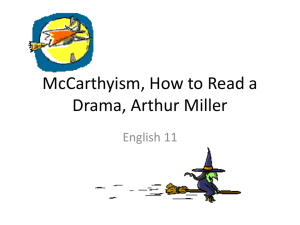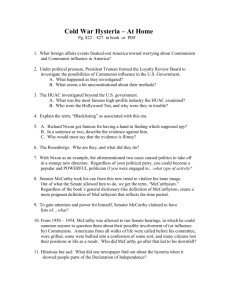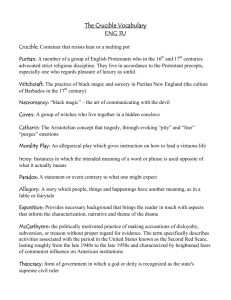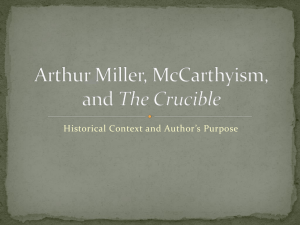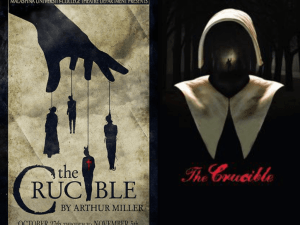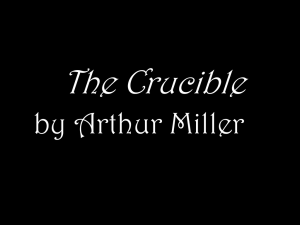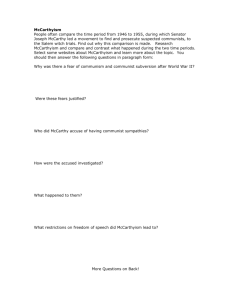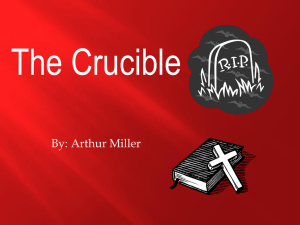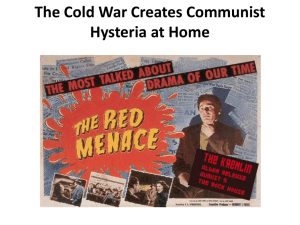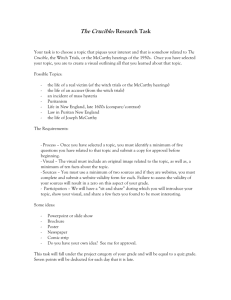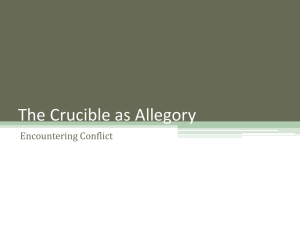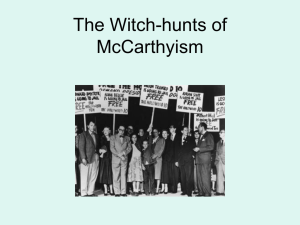McCarthyism and The Crucible
advertisement
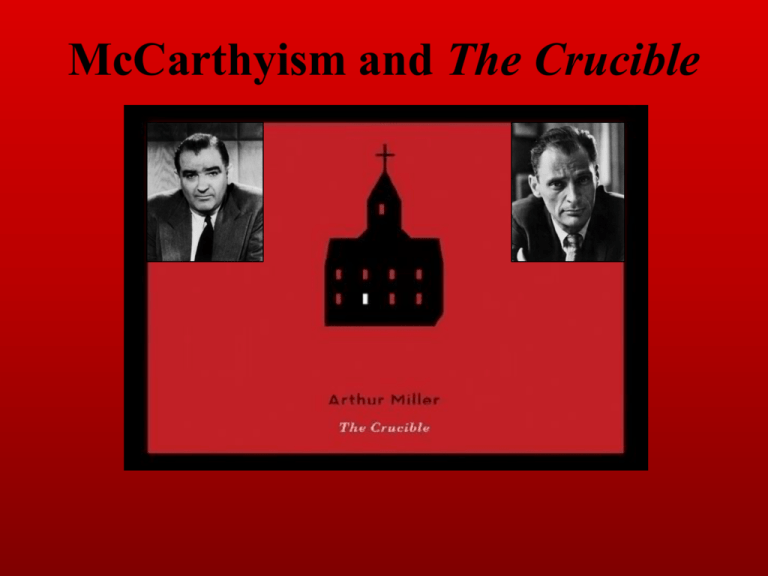
McCarthyism and The Crucible The Red Scare (the second) After World War II, the U.S. was overwhelmed with fear and worry over the growth of communism in Eastern Europe and China. Was the fear justified? The Communist Party grew in America in the 1930s as a vocal opponent of Nazi fascism and as part of the growing union movement in response to the economic devastation of the Great Depression. The Cold War The Soviet Union tested an atomic bomb in 1949, four years after the U.S. bomb. They developed the bomb with information supplied by spies in America. Revolution in China Also in 1949, Mao Zedong’s Communist army gained control of mainland China, defeating the Kuomintang, which had the support of the United States Korean War In 1950, the Korean War began. The U.S., the United Nations, and South Korea fought Communist forces from China and North Korea. House Un-American Activities Committee Americans began to look for Communist spies trying to overthrow the gov’t from within. Congress established HUAC to investigate suspected traitors. Hollywood Ten One of the main places the committee looked for communists was in the entertainment industry. The first ten Hollywood witnesses subpoenaed refused to cooperate. Blacklisting The Hollywood Ten were jailed and not allowed to work in Hollywood. This practice was known as blacklisting. Hundreds, maybe thousands, were blacklisted in the 50s. Joseph McCarthy McCarthy, a senator from Wisconsin, made public claims that Communists had infiltrated the U.S. gov’t. He claimed that many of them worked in the State Department. McCarthyism McCarthy did not start the anti-communist movement, but he became its most prominent spokesman. McCarthyism quickly took on a negative meaning. McCarthyism The term soon came to describe poorly supported or unsubstantiated attacks or using accusations of communism to pressure someone to conform to certain political beliefs. Arthur Miller Arthur Miller is one of the greatest playwrights is American literature. His 1949 play Death of a Salesman is one of the most outstanding American plays ever written. Witch Trials After his friend Elia Kazan, the man who directed his greatest plays on Broadway, testified before HUAC, Miller began researching the Salem Witch Trials. The Crucible Miller saw many parallels between the witch trials and McCarthyism. The play that resulted is The Crucible, a drama about people unjustly accused of witchcraft in Salem in 1692 The Crucible The Crucible uses the witch trials as a metaphor for McCarthyism, suggesting that McCarthy-style persecutions can occur at any time or any place. The Crucible The play highlights the fact that once accused, either in Salem or in Washington or in Hollywood, a person would have little chance to clear his or her name. Repercussions As a result of The Crucible, Miller was asked to testify before HUAC. Miller talked about his own political activities, but he refused to discuss other people. Repercussions “I could not use the name of another person and bring trouble on him,” Miller told the committee. He was found guilty of contempt of Congress. McCarthyism at Work You are accused of being a communist! No Are you a communist? Yes Are you prepared to name some other people that you know are also communists? Yes Lenient sentence for cooperating. No • Jail sentence of up to a year. • Fired from job. • Career ruined. Witch Hunting at Work You are accused of being a witch! No Are you a witch? Yes Are you prepared to name some other people that you know are also witches? No Yes Go to jail! Death by hanging! Conclusions The methods used by McCarthy and HUAC were unethical and resulted in thousands of innocent people having their lives ruined. McCarthy himself was often dishonest in his accusations, looking for headlines and power more than justice and establishing himself as a demagogue. Conclusions Nonetheless, there was a threat. There were communists in the United States who were working with the Soviet Union to overthrow the U.S. government. Two of the most prominent people often seen as being victims of McCarthyism, Alger Hiss and Julius Rosenberg, were later shown to be communist spies who gave the Soviets vital American secrets. Conclusions In Salem, however, there were no witches, as far as we know. Nineteen people died, not because they were in league with the devil, but because their neighbors were angry, suspicious, afraid, greedy, or spiteful. Or it could have been a hysteria caused by a fungus on the grains called ergot.
